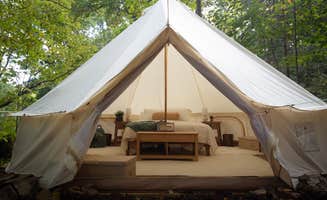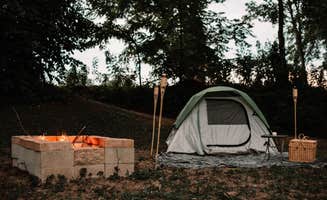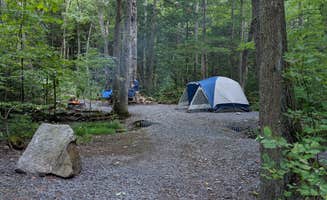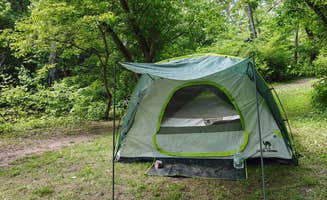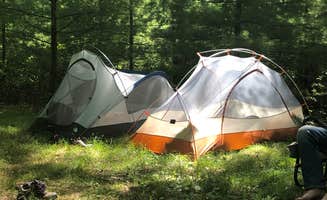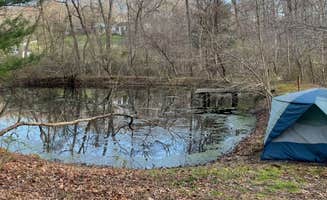Tent campsites near Marysville, Pennsylvania offer diverse primitive camping options throughout the Appalachian Mountain region. Most sites are situated between 400-900 feet elevation in mixed hardwood forests, with summer temperatures averaging 75-85°F during peak camping season. Winter camping is available at select locations, though water systems are typically winterized from November through March.
What to do
Hiking trails access: Penn Roosevelt State Park Campground provides direct connections to multiple trail systems. "The area has lots of hikes to offer including the Alan Seeger State Forest, Midstate Trail and several others," notes camper Denise D. Trailheads are accessible directly from the camping area.
Creek activities: At Mill Creek Camping Area, sites are positioned along flowing water. According to Meagan J., "Campsite for where we stayed is down by the creek making for a cooler camping experience and love the sound of water flowing at night." The creek provides natural cooling during hot summer days.
Kayak camping: For water enthusiasts, designated sites allow boat-in access. One visitor to Lower Allen Community Park explains, "You can put in a few miles up and float down to your site. There is parking right there." This option combines paddling with overnight stays along waterways.
What campers like
Secluded environments: Primitive camping areas offer varying degrees of isolation. Chuck M. from Penn Roosevelt State Park shares, "It was so secluded, I heard nothing but nature for over an hour before a plane flew over." Many campers value this remote quality.
Refreshing water access: Stream proximity provides natural cooling benefits. Philip B. from Lancaster County Mill Creek reports, "The stream is refreshing and the site stays fairly cool. When it hits the high temperatures a quick dip in the water is amazing." Water features enhance comfort during summer months.
Modern eco-facilities: Despite rustic settings, some areas offer updated amenities. At Reeds Gap State Park Campground, Paula L. appreciates the "super clean, eco-shower. Timed water, lights (solar?)etc. are spot on for me!" These sustainable facilities maintain wilderness feel while providing basic comforts.
What you should know
Seasonal water availability: Utilities vary throughout the year. At Penn Roosevelt State Park, Chuck M. notes: "The water was off, but I was prepared to wilderness camp later in my trip so, that was no big deal." Winter campers should prepare for limited water access.
Public trails through campsites: Some camping areas have trail traffic nearby. At Mill Creek, Sakina P. warns, "Hikers take any trail instead of marked trails regardless of families camping in private areas." Consider site placement when reservations are available.
Reservation requirements: Policies vary by location. For example, Lower Allen Community Park requires advance booking: "You just need to call the township to reserve." Some parks use honor system payment methods while others require confirmed reservations.
Tips for camping with families
Park accessibility: For families with young children, choose sites with amenities. Jill R. at Penn Roosevelt State Park shares, "There were not many people around so the kids could frolic and be slightly loud without bothering any other people." Low-traffic periods provide more flexibility for families.
Playground access: Several camping areas include recreation facilities. Rebecca G. from Reeds Gap State Park Campground notes the "picnic pavilions and a playground for the kids!" These features provide alternative activities when children need breaks from hiking.
Bathroom proximity: Susquehannock State Park Campground offers improved facilities. As David G. describes, "The bathhouses are rebuilt recently and are very nice." Consider site distance from restrooms when camping with children.
Tips from RVers
Size restrictions: Most primitive camping areas near Marysville limit RV access. Chuck M. cautions about Penn Roosevelt: "If you have a trailer, I do not recommend this spot. There is a very tight hairpin turn on the way in. My six foot long trailer barely made the turn!"
Alternative options: For RV campers, Susquehannock State Park provides more accommodations. David G. reports, "One has a few sites with electric and some cabins. Potable water is available in several places on each loop." Many parks offer hybrid camping options with both tent and limited RV sites.
Loop considerations: When RVing, assess campground layout. At Susquehannock, David G. notes, "Two loops. One has a few sites with electric and some cabins." Choose sites based on required hookups and proximity to water sources.


